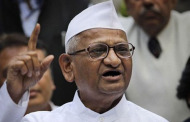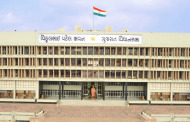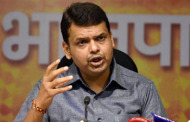China to Pay Nepal to Keep Tibetan Dissenters at Bay
Firming up ties with Nepal, Chinese President Xi Jinping has pledged NRs 14.5 billion to Nepal for transport and infrastructure building as Kathmandu promised to keep up the crackdown on Tibetans supporting the Dalai Lama.
Chinese President Xi Jinping announced the 900 million RMB (NRs 14.5 billion) economic aid package for Nepal during his meeting with Nepal President Ram Baran Yadav on the sidelines of Boao Forum for Asia in Hainan Province in China yesterday, Nepal Foreign Ministry officials said.
“China appreciates Nepal’s firm support on issues concerning China’s core interests, including issues related to Tibet and Taiwan,” Xi said, apparently referring to Kathmandu’s crackdown on Tibetan refugees crossing over to meet the Dalai Lama at Dharamshala in India.
Xi hoped that Nepal would not allow any forces to use Nepal’s territory to engage in anti-China separatist activities.
He said China will continue to support Nepal’s effort in safeguarding independence, sovereignty and territorial integrity.
Yadav said Nepal would never allow its territory to be used by any anti-China activities.
The assistance will be used to upgrade the 115-km Araniko Highway that links Nepal with China, and to develop the transport infrastructure, foreign ministry sources said here.
China is also willing to initiate talks on Free Trade Agreement with Nepal at an early date, Xi said, adding that the two countries should work on traffic interconnectivity, infrastructure, hydro power development, modernisation of agriculture and science and technology.
Xi welcomed Nepal’s participation in the Silk Road projects unveiled by him at the forum to improve China’s connectivity to Europe through a maze of road, rail and port network.
The two sides are also planning to beef up the connectivity with rail and road links, amid concerns in India over China’s growing influence in the Himalayan country.
Early this month, China had increased its annual aid to Nepal to USD 128 million from USD 24 million.
With the massive victory for the BJP in the last Lok Sabha elections, the RSS feels the need to be close to the action.
Keshav Kunj, Rashtriya Swayamsevak Sangh’s Delhi office, to make way for 11-storied twin towers
The tectonic political shift brought about by the Narendra Modi-led and RSS-guided victory for the BJP in the last Lok Sabha election is likely to lead to another significant change.
The RSS has begun work on constructing two 11-storied buildings on a 3-acre plot in the heart of New Delhi where its current Delhi headquarters Keshav Kunj is located. And the buzz is that the RSS will eventually move its national headquarters here from Nagpur.
Portions of Keshav Kunj are already being dismantled – the change not at all visible from the outside. Sources said material saved from the old building will be used in the construction of the twin towers, which, it is reliably learnt, will retain the name.
“Space in Delhi – over the years – was becoming a major problem for the party, its leaders, pracharaks and affiliates. The party has expanded in the last 15 years,” said a person well versed with the plan, which was shown in a power point presentation a fortnight ago to top RSS leaders, including Mohan Bhagwat.
Currently, the RSS has a little over 6 million active members who operate its 50,000-plus morning shakhas across the country. Its operation in Delhi has assumed greater importance following the BJP’s stupendous victory in the 2014 polls.
The twin towers, likely to cost around Rs 50 crore, will have accommodation for leaders, members, pracharaks, and also those who work for the RSS and currently operate from various offices located in Delhi. There will be spacious libraries full of books written by RSS leaders, both past and present; a new room for press conferences equipped with instant power point presentations; and a yoga room too. Around the twin towers, there will be space to grow organic fruits and vegetables and laboratories to develop ayurvedic medicines.
Interestingly, organic vegetables currently being grown around the existing building for in-house consumption are also delivered to select leaders in Delhi, including Prime Minister Narendra Modi and Transport Minister Nitin Gadkari.
Sources close to the RSS claimed that if required, the party could even rent out some floors to both government and private companies in the twin towers. But that decision will only be taken after a full estimate is presented to the top brass about the needs of the party affiliates, currently numbering close to 40.The leadership is aware that the construction of the twin towers could create unnecessary controversy, mainly because of RSS’s focus on nofrills existence. And that’s the reason why the construction of the twin towers is being kept an extremely low-key affair.
The controversy courted by the Congress party when it had planned to shift into a swanky building close to the imposing Meridien Hotel in New Delhi is fresh in everybody’ memory. Eventually, the party remained at its government-sanctioned bungalow on Akbar Road near the Taj Mansingh Hotel and turned the building into Rajiv Gandhi Institute for Contemporary Studies.
The source said the decision to create the twin towers was taken three years ago by the RSS high command – with active encouragement coming from then BJP president Nitin Gadkari – but could not fructify because of a lingering court case with the state-owned Debt Recovery Tribunal (DRT) which had its office in the old building. Only recently, the DRT agreed to vacate Keshav Kunj, thus paving the way for the RSS to start construction.
Architects for the twin towers are a secret so that the news does not leak out on the prized project, which political observers said will catapult the RSS into the leagues of powerful political parties with impressive offices. Besides their headquarters located in Lutyen’s Delhi, the Congress has the magnificent Rajiv Gandhi Institute, and controls the Teen Murti Bhawan and its spacious and wellstocked Nehru Library. The Communist Party of India (CPI) has Ajoy Bhawan near the city’s Fleet Street, while the Communist Party of India (Marxist) has the imposing AKG Bhawan close to iconic Birla Mandir in the heart of the city.
Former Republican California gubernatorial candidate Carly Fiorina said over the weekend it is very likely she will run for president on the GOP ticket. If the former Hewlett-Packard CEO runs, she could be the Republican answer to Hillary Clinton.
Appearing on “Fox News Sunday,” Fiorina said she is “higher than 90 percent” likely to run in the upcoming presidential race, according to the Washington Post. She ran in 2010 for California governor, and now she says she will use her economic expertise gained in corporate America to continue improving the economy. She will announce her decision in April or May.
Fiorina argued she will appeal to voters thanks to her “deep understanding of how the economy actually works, having started as a secretary and become the chief executive of the largest technology company in the world.”
Touting similar Republican talking points as other potential candidates, Fiorina blames the government for “crushing small businesses now.” She adds that it has “tangled people up from a web of dependence from which they can’t escape.”
However, she echoed more anti-establishment rhetoric by calling on more support for community banks, which are foundering as corporate banks grow.
“If we want mainstream and the middle class going and growing again, we’ve got to get small and family-owned businesses going and growing again,” she said.
However, the former CEO is also proud of her position and how well she did her job. According to Bloomberg, she also told the Fox News show she had increased HP’s revenue during her tenure.
“We took Hewlett-Packard from about $44 billion to $88 billion in six years. We quadrupled cash flow,” Fiorina said on “Fox News Sunday.” “We went from a market laggard to a market leader in every product category and every market segment.”
Taking aim at potential Democratic candidate Hillary Clinton, Fiorina commented on the recent email debacle engulfing the former Secretary of State.
“There’s a competence issue now. Anyone in 2015 who says you can’t have two email accounts on a single device obviously doesn’t understand technology,” she said.
Fiorina fashions herself, in a way, as the anti-Clinton and courts female conservative voters, according to Time.
Back in February, Fiorina took a swipe at Clinton during CPAC, asking her, “Mrs. Clinton, name an accomplishment.”
Mumbai: Maharashtra government will construct 11 lakh houses in Mumbai and about seven lakh in the Mumbai Metropolitan Region (MMR), state Housing Minister Prakash Mehta said on Tuesday.
Out of the total, 50 percent of the houses will be completed in next five years, he told the Legislative Assembly.
“The government could bring down the number of the cessed buildings in the city to 16,000 from 19,000 few years ago. We have decided to complete the redevelopment of all the cessed buildings in next five years. FSI for such buildings have already been raised to 3 from 2.5 and we would not hesitate to increase it to 3.5, if the need be,” Mehta said.
He was replying to a debate on the budgetary allocation to the housing department late last evening.
The minister also said that the redevelopment projects by Mhada (Maharashtra Housing and Area Development Authority) will be monitored to ensure the completion of the projects.
“We will not shrug off the responsibility of the completion of redevelopment projects by merely issuing no objection certificate. Mhada will monitor all the development projects till its completion so that they are not delayed,” he said.
Responding to the alleged corruption and delays in the implementation of the slum rehabilitation projects, Mehta said rehabilitation of the slums will be allotted to builders by the government.
“We will prepare the master plan of the slum rehabilitation by preparing a list of slum dwellers across the city. The projects will be allotted through e-tendering. This will help us in completing the projects on time,” he said.
BJP MLA Ashish Shelar, on the other hand demanded white paper on the slum rehabilitation projects and also alleged that government officials were “stalling the projects for obvious reasons.”
Mehta also announced that the builders would be allowed to go for redevelopment (of buildings), irrespective of the construction year, if the government authorities have announced them dilapidated.
Hence, even a building constructed in 2000, can go for the redevelopment, he said.
He said a plan has been chalked out for construction of about 50,000 tenements for police personnel in Mumbai with private participation.
PTI
Thane: A woman from Ulhasnagar area here was allegedly sold by a woman under the pretext of providing her job, police said on Sunday.
The victim, 35, a resident of Ulhasnagar camp no. 3, was allegedly sold for Rs 80,000 by a woman, aunt of one of victim’s friends, who took her to Rajasthan and Punjab, Ulhasnagar police station sub-inspector GJ Patil said.
According to the complaint filed by the victim with Kalyan Railway Police Force (RPF), she was taken by a woman, who she claimed to be her friend’s aunt on January 19 from dadar railway station to various places in Rajasthan and Punjab and was sold for Rs 80,000 for doing domestic works.
But, later in February she managed to come back to Mumbai and filed a complaint with Kalyan RPF, which later forwarded the case to Thane Police Commissionerate that transferred it to Ulhasnagar police station yesterday, he said.
The exact place where she was sold was not specified in the woman’s complaint.
No arrest has been made so far and police is also investigating if there was a flesh trade racket involved in it.
PTI
Pune: Social activist Anna Hazare has written a letter to Prime Minister Narendra Modi and urged him not to amend the provisions of the existing Land Acquisition Act.
Anna, who has been leading a campaign against the Land Bill introduced by the NDA government, asked PM Modi in the letter not to amend the existing Land Acquisition Act which was introduced in 2013 by the then Congress-led UPA government.
It may be noted that the Congress president had recently written to the social activist, expressing solidarity with his agitation against the current Land Bill.
Opposition has been up in arms against Modi government’s Land Acquisition Bill which they claim is pro-industry and anti-farmer. That Bill has already been passed in Lok Sabha and awaits Rajya Sabha’s nod, where Opposition is in majority.
The Modi government is already thinking of re-promulgating the Land Ordinance on which the amended Land Bill is based before its expiry, as it senses roadblocks in the Upper House.
Anna had recently asked for an “open debate” with Prime Minister Modi on the controversial clauses of the proposed law.
In response to a query about Union Minister Nitin Gadkari’s willingness to debate the Bill with those opposed to it, Anna had said, “Gadkari’s homework is weak. We are ready to have an open debate with the Prime Minister on camera to discuss the issue threadbare. Let the people watch this debate and see the facts for themselves.”
Gandhinagar: After failing to get Presidential assent for its anti-terror bill thrice, the Gujarat Assembly on Tuesday passed by majority vote the controversial Gujarat Control of Terrorism and Organised Crime (GCTOC) Bill in a new form.
The Bill allows police to intercept and record telephonic conversations, and submit them in court as evidence.
The GUJCOC Bill, which is on the lines of the stringent Maharashtra Control of Organised Crime Act (MCOCA), was rejected in 2004 and 2008 by the then President AJP Abdul Kalam and Pratibha Patil respectively, who had suggested some amendments in the provisions related to telephone interception and confession made before police officer being considered as evidence in court.
After its passage for the third time in the State Assembly without any changes, the Bill is still pending for clearance from the President.
The Bill was today passed by a majority vote amid stiff resistance from Opposition Congress, which walked out of the House over its controversial provisions.
The state government re-introduced the Gujarat Control of Organised Crime (GUJCOC) Bill in the Assembly after renaming it. The bill, however, has retained the controversial provisions.
The contentious provisions of the Bill include admissibility of evidence collected through telephonic interception and confession made before police officer as evidence in court.
The Bill was introduced in the House by Minister of State for Home Rajnikant Patel, after which a long debate took place on it, in which Opposition Congress demanded removal of controversial sections like telephonic interceptions, confessions made before some police officer as evidence and time limit of 180 days for filing of chargesheet.
At the end of the discussion, Congress leader Shankarsinh Vaghela and Shaktisinh Gohil insisted that the controversial provisions should be dropped as per the suggestions of past Presidents when they rejected the Bill.
However, Patel said that the provisions of this Bill are in favour of the nation, the people of this country and it allows us to take action against traitors and refused to drop those sections.
Subsequently, Congress walked out of the House.
Later, the Bill was passed by majority vote in the State Assembly.
Section 14 of the Bill says, “Notwithstanding anything contained in the code or in any other law which is in force, the evidence collected through the interception of wire, electronic or oral communication under the provisions of any other law shall be admissible as evidence against the accused in the court during the trial of the case.”
According to Section 16 of the Bill, accused’s statement before a police officer, not below the rank of Superintendent of police, will be treated as an evidence.
While, Section 20 (2) (b) says stipulated time to complete probe and file the chargesheet can be exceeded to 180 days (six months) from the current stipulated time of 90 days.
Another controversial provision under the bill is section 20 (4), which reads “no accused person in this act shall be released on bail or on his own bond unless the public prosecutor has been given an opportunity to oppose the application, the special court is satisfied that there are reasonable grounds for believing that accused is not guilty of such offence and that he is not likely to commit any offence while on bail.”
The cases under the act can be tried only in a special courts set up for this purpose.
Congress leader Shaktisinh Gohil objected to the provisions of the Bill and said that some of them are even unconstitutional.
He told the House that the provision of confession before a police officer is contradictory with Indian Evidence Act as according to Section 164 of CrPC and Indian Evidence Act, a statement before the magistrate can only be considered as an evidence.
On the provision of not releasing an accused on bail, Gohil said the provision is unconstitutional which deprives the right of an accused to get released on bail on his own bond.
However, the government justified the provisions in the Bill by saying that existing legal frame work like the penal and procedural laws and adjudicatory system have been found to be rather inadequate to curb or control the menace of organised crime.
“It is therefore considered necessary to enact a special law with stringent and deterrent provisions,” the state government said in the objectives of the Bill.
About the provision of telephonic interceptions, the ‘Statement of Objects and Reasons’ in the Bill states that this is necessary in these times where organised criminal syndicates make extensive use of wire and oral communication.
It says that the interception of such communication to obtain evidence is inevitable and an indispensable aid for the law enforcement.
Former president APJ Abdul Kalam had in 2004 raised objections over Section 14 (telephonic interception as evidence) and returned the bill to the government led by the then chief minister Narendra Modi, asking it to remove the clause.
Later in 2008, the Bill was passed after deleting the clause related to interception of communication, as per the suggestion of Kalam.
However, then President Pratibha Patil rejected it and suggested some more amendments. One of them was to eliminate the provision which allows admissibility of confession made before a police officer in the court as evidence.
However, ignoring the suggestion, the state government had once again passed the bill in 2009 for the third time and sent it for President’s approval.
The old Bill is still pending with the President.
But the ruling BJP hopes that as the NDA government is in power at the Centre, the new Bill is sure to pass the test there.
(With PTI inputs)
I could not count my heartbeats but I could feel the numbers of heart beating for me as I walk the ramp for #MissIndia2015 in #YashRajStudios-Mumbai. As advised by you all I celebrated being there, enjoyed every moment, gave my best and cheered for myself and made it to Top10 Finalist of #fbb #FeminaMissIndia. You all were my partners in progress.
I sincerely acknowledge the silent prayers, ground swelling support, overwhelming response in the new age technology. I stand up in ovation to thank all my friends and family who stood by me, spent time to make me who I am today. It was indeed a life time opportunity and wonderful experience to cherish and with courage to carry on.. Thank you all for your messages of congratulations and encouragement, it will take a week for me to read and reply. Believe me, its you all who made this small town girl #MissIndia #MissPopular and #MissMultimedia. I will cherish this as long as I live.
I said, now I reiterate ,’Success is not Final, Failure is not Fatal, it is the Courage to continue that Counts….’.
I seek your blessings and support to carry on career with courage. .
#Thaaaanks #Muuuaaaaahhhh #Thankyou
Heatadaua- A small town at the foothills of Kathmandu has witnessned the most bizarre situation of all times. A huge rhinoceros is walking freely on the roads and caused the death of a of a woman and one injured. The Rhino has caused terror in the small while rampanging anything between on the way.
The Rihno has strayed away from a local wildlife sanctuary.
Maharashtra Chief Minister Devendra Fadnavis has defended his Minister Girish Mahajan who is being criticised for attending a children’s event with a revolver tucked in his waist.
The CM said Mahajan has not broken any law.
Mahajan also later clarified that he carries the weapon for self-defence and that he has not been involved in any kind of violence.
The issue of Water Resources Minister Mahajan carrying a revolver, which was very much visible, at an event on Saturday for deaf and mute children in Jalgaon city was raised in both the Houses of state Legislature here on Monday.
Ads by ZINC
In the Assembly, the Opposition Congress and NCP demanded sacking of the minister for attending a function of differently-abled children with a revolver tucked in his waist as it sent a wrong message in the society. The Opposition members boycotted the Question Hour in protest.
Fadnavis said the Opposition was trying to create an unnecessary controversy. “Mahajan has a licence to carry weapon for last two decades. Licence holder is expected to carry the weapon and not keep it at home,” he said.
However, he agreed that the weapon was visible while the minister attended a function and necessary directives would be given to him in this regard.
When the matter was raised in the Council, Fadnavis said, “Girish Mahajan has a licence for keeping a weapon. He is carrying it with him from the last 25 years. A licence is given only when a person needs to keep a revolver for his safety. He has not broken any law by carrying a revolver.”
The chief minister was replying to Sunil Tatkare (NCP), who took a jibe at Mahajan and questioned the need to carry a revolver at the children’s event.
“His revolver was tucked in his waist and a controversy was created out of it by news channels when a portion of the pistol became visible inadvertently,” Fadnavis said.
Meanwhile, Mahajan later said that his revolver is merely for self-defence and that he has not been involved in any kind of violence before.
“I admit that the revolver was visible. But never have I pointed a revolver, or gotten involved in violence of any kind in my life. The revolver is merely for self-defence,” the minister told reporters here.
Earlier, the issue was raised by NCP group leader Jayant Patil in the Legislative Assembly soon after the House assembled for the day.
He wondered if the state’s law and order situation was so bad that a minister needed to carry a revolver to a school.
NCP leader Ajit Pawar demanded sacking of Mahajan.
“Why was the minister trying to scare the citizens by displaying his weapon?” Pawar asked.
Leader of Opposition in Assembly Radhakrishna Vikhe Patil and NCP member Chhagan Bhujbal also criticised Mahajan for possessing a revolver while addressing children in school.
They demanded a statement from the government and discussion on the matter.
Assembly Speaker Haribhau Bagde said the minister’s conduct was inappropriate and that he would issue necessary directives to the government in this regard.
Education Minister Vinod Tawde said Mahajan was expected to return to Mumbai in the evening.
“It is only then we can know his side of the story,” Tawde added.
Shiv Sena leader and state Environment Minister Ramdas Kadam said that if the minister was carrying a licensed weapon, there should be no problem.
















Recent Comments